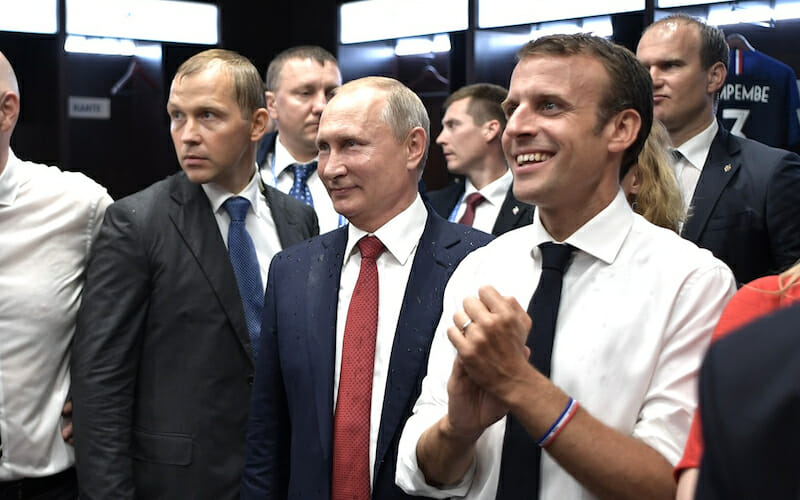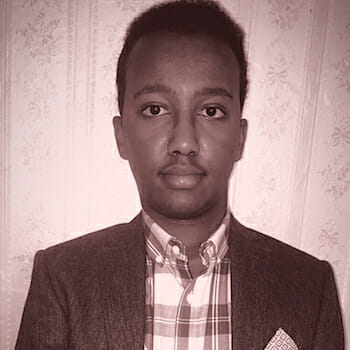
Macron in Moscow: Is a Détente Possible?
While the world is closely watching the Helsinki summit between Donald Trump and Vladimir Putin, President Putin also met with President Macron of France in the Kremlin before the kickoff of the final match of the World Cup while hosting several leaders that had visited Moscow to attend the last game. Macron was in St. Petersburg in late May to attend an economic forum and again met with President Putin.
President Putin opened his statement by congratulating the French national team for “reaching the World Cup final.” Vladimir Putin also emphasized bilateral trade between the two countries. Trade is an area that can deepen ties between Russia and France. In return, Macron congratulated Russia’s team for “doing well,” as well as successfully hosting the games.
Following Macron’s election, diplomatic channels between Paris and Moscow have resumed. Macron has surprisingly developed a close working relationship with Putin. Macron hosted Putin in Versailles a few weeks after his election. Macron expressed his willingness to invite Putin to attend the G7 summit next year in Biarritz if Moscow agrees to follow through on the Minsk agreement to resolve the conflict in Donbass.
The two presidents discussed a number of subjects including the Middle East peace process between Israel and Palestine, Syria, Iran and the future of the multilateral nuclear accord, but major initiatives were not announced, although Macron described it as an opportunity to “continue a dialogue on bilateral issues as well as global issues.”
The recent decisions by President Trump to withdraw from the Iran nuclear deal and to move the U.S. embassy to Jerusalem opened up a door for both Russia and the E3 members of the deal (Britain, France and Germany) to work together to preserve the multilateral accord and to work for a peaceful solution between Israel and Palestine.
In the Levant, while Russia and France have diverging interests, Macron shifted from the former French position of insisting on the ouster of Bashar al-Assad to a position that favors Assad remaining in power. However, this comes with a price. Macron is willing to use force if his own red lines are crossed in Syria as happened in April. Russia is the leading actor in Syria and has successfully managed to secure its interests in the region. Moscow’s task at the moment is to find a solution that addresses Israel’s security concerns over Iran’s expanding influence in Syria while maintaining close relations with both Syria and Iran.
Another area where both countries can find some common ground is in Libya. The NATO-led intervention in Libya was a turning point for Moscow’s rapprochement with Washington during the reset era in the Obama years. France was an active player involved in counterterrorism missions, as well as cooperating closely with local actors and regional powers such as Egypt and the UAE. Paris plays a pivotal mediating role in Libya by recognizing the UN-backed government in Tripoli while working closely with Haftar’s forces in Eastern Libya. But since Emmanuel Macron was elected, it seems that Paris is signaling a shift to its previous position by directly supporting Haftar’s Libyan National Army (LNA). As France’s influence across the MENA region is strongest in North Africa, Paris’s presence in Libya appears to be a long-term geo-economic interest.
Russia’s long-term goals in Libya is comprised of geopolitical and economic interests. Moscow lost several major contracts regarding Libya’s energy, construction, and arms export during the Gaddafi regime. Although the Kremlin’s strategy towards Libya seems unclear, Moscow is interested in setting up a military base in Libya, which gives it access to the southern region of the Mediterranean Sea and is a bargaining chip against the European Union. In order for Moscow to achieve its objectives in Libya, the Kremlin engages with local stakeholders. Moscow has not yet supported one side over another but maintains open channels of communication with different actors A year ago, a spokesperson for the Russian foreign ministry described Moscow’s endgame in Libya as “ensuring that Libya is held together by resolving the difference between the local groups through talks.” Furthermore, the spokesperson made it clear that Russia is “engaging with the local centers of power” in the country.
While Russian and French interests in Libya do not converge, countering terrorism and maintaining political stability in Libya offers the opportunity for both countries to work together by cooperating with local factions as well as other regional powers. There will be some competition between the two countries over dominance in Libya. The energy industry in Libya is the main area where cooperation and competition between France and Russia will focus. France’s foreign minister, Le Drian, a key driver of Paris’s policy towards Libya, is visiting major cities in Libya in the coming days to maintain a “balance or overtake the influence of Russia,” according to Theodore Karasik, a senior advisor at Gulf State Analytics.
The U.S. has few options when it comes to resetting strained U.S.-Russia relations, but the resumption of high-level diplomatic discussions between the U.S. and Russia and between Russia and the EU accompanied by some pragmatic moves will help reset relations between the former Cold War foes.
